The Internet Archive has lost its appeal of a successful lawsuit brought against it by a group of book publishers. The subject was the IA's Free Digital Library. The Free Digital Library loans electronic copies of books over the internet. This is no small hometown library. According to the Second Circuit Appeals Court that issued the judgment, it loans about 70,000 books a day, 25 million a year, to 5.9 million users. Online is the only way a library could operate with such volumes. As a result of this decision, over 500,000 books are no longer available through the Free Digital Library.
The books they loan aren't typical e-books, created electronically by the publisher. What they loan are scanned copies they have made of books they own, or are owned by related parties and contributors. They possess the physical copy, but they have to create a digital version to loan it online to anyone in the world.
The nub of this dispute is that over 3.2 million of these digital copies are of copyrighted books. It is well established that they can loan the physical books they possess. This is long established law. What's known as the “First Sale” doctrine is what lets you loan, sell, or give away any legally purchased book you have. This is what libraries do. However, copying a copyrighted book is in most cases illegal. That's what copyrights do. The question was where in that spectrum does the Free Digital Library fall.
The way the law works is it outlaws any sort of copying of books but then creates a group of exceptions called “Fair Use.” There are four tests used to determine whether use is “fair use,” not necessary for us to go into details now. Some obvious examples of fair use are book reports, reviews, scholarly or less-than scholarly quotes from a book. Even some complete copying may be allowed, such as making a personal photocopy of a book you own that is falling apart and hard to read anymore. An obvious case of not being Fair Use would be to copy a book and sell it.
While there is balancing of the four tests, the major issue and the one the court focused on is whether the new work is “transformative.” Again simplifying a bit, “transformative” means does it create something new and different. That is why making photocopy and selling it is not allowed; it is essentially the same thing, while book reviews and quoted sections are clearly something different. It has been transformed.
On the surface, it doesn't look like the IA transformed it at all in that it is the exact same text. However, the IA argued that converting it to an electronic file is transformative, it is something different, but the court said it is still the same book and copyrights apply to ebooks too since so much of the trade is now conducted in electronic versions. The IA countered that making the book and the knowledge therein available to a wide audience the books could never reach before was transformative, but again the court said that was not the right kind of transformation. While the court closely examined the four factors in its opinion, reading it one gets the impression the judges had made up their minds on a common sense basis – allowing the IA to copy and distribute free copies to the the world would eviscerate if not destroy the value of copyright protection to the authors and publishers. They can't compete against free, and no financial incentive means no more new books.
On the other hand, 300 authors signed a letter in favor of the IA and some scholars made very strong arguments. They pointed out that copyright laws were not passed to protect the financial interests of authors. They were passed to increase the amount and reach of knowledge, get as much information available to as many people as possible. However, financial incentives get authors to write and publish more, thereby increasing knowledge. My mother having written schoolbooks, I can attest that this was her primary incentive, additional income for the family. She wouldn't have done it free.
On the other hand, what the IA has done is take books that may be unavailable at any library within a reasonable distance of you, if available at all, and enable you to read them. There is little doubt that they have increased the spread of knowledge immensely, the intention of copyright law. The reality is that copyrights increase the creation of knowledge, but decrease its availability to many people.
A reasonable change, although the devil is in the details of implementing it, would be to place books in the public domain where anyone can access them if they have not been reprinted in some number of years. The reality is most books are printed in an edition or two and never printed again. Within a few years, the royalties disappear. Nonetheless, copyright terms have been extended several times, and now typically run around a century. My mother wrote a biography of Isaac Newton for middle school children. For a decade it brought in some nice royalties, but after that they dried up. It is extremely unlikely it will ever be printed again. It has been almost 40 years since she received her last royalty check, but for another 50 years it will still be copyright protected, meaning almost no one will be able to access it. The law will “protect” her heirs from nonexistent losses. Meanwhile, her book has effectively ceased to exist. This is a case where copyright law is reducing the spread of knowledge while providing no incentive at all for anyone to create anything.


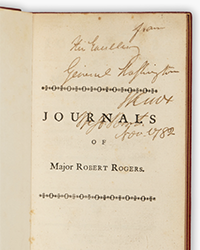
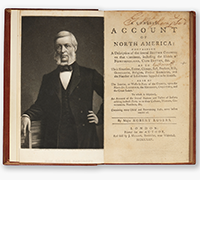
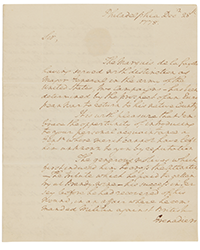
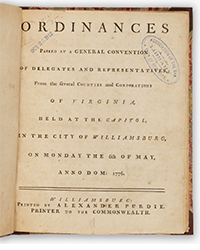
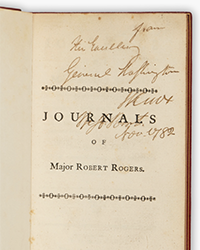

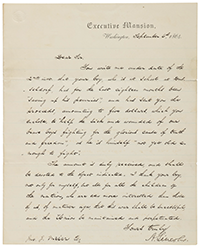
![<b>Sotheby’s, Jan. 27:</b> [World War II]. An archive of maps and files documenting the allied campaign in Europe, from the early stages of planning for D-Day and Operation Overlord, to Germany’s surrender. $200,000 to $300,000. <b>Sotheby’s, Jan. 27:</b> [World War II]. An archive of maps and files documenting the allied campaign in Europe, from the early stages of planning for D-Day and Operation Overlord, to Germany’s surrender. $200,000 to $300,000.](https://ae-files.s3.amazonaws.com/AdvertisementPhotos/9d2762bc-9f26-47ef-96de-1c28070e19f6.png)
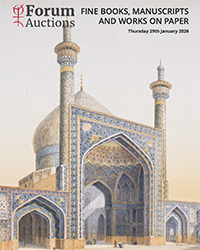
![<b>Forum, Jan. 29:</b> Plato. [<i>Apanta ta tou Platonos. Omnia Platonis opera</i>], 2 parts in 2 vol., editio princeps of Plato's works in the original Greek, Venice, House of Aldus, 1513. £8,000-12,000 <b>Forum, Jan. 29:</b> Plato. [<i>Apanta ta tou Platonos. Omnia Platonis opera</i>], 2 parts in 2 vol., editio princeps of Plato's works in the original Greek, Venice, House of Aldus, 1513. £8,000-12,000](https://ae-files.s3.amazonaws.com/AdvertisementPhotos/df7dd9ac-f0d0-4cb3-a44d-2731758530e4.png)
![<b>Forum, Jan. 29:</b> Book of Hours, Use of Rome, In Latin, illuminated manuscript on vellum, [Southern Netherlands (probably Bruges), c.1460]. £6,000-8,000 <b>Forum, Jan. 29:</b> Book of Hours, Use of Rome, In Latin, illuminated manuscript on vellum, [Southern Netherlands (probably Bruges), c.1460]. £6,000-8,000](https://ae-files.s3.amazonaws.com/AdvertisementPhotos/c40bad29-8cb5-4347-a0fd-5361d39e84a5.png)
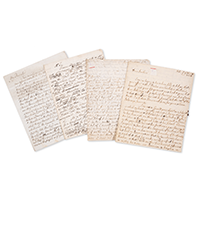
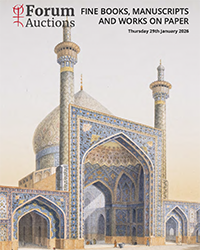
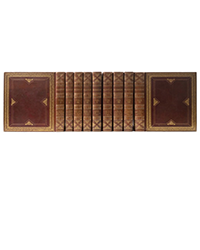
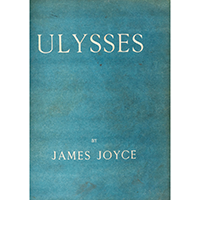
![<b>Forum, Jan. 29:</b> Powell (Anthony). [<i>A Dance to the Music of Time</i>], 12 vol., first editions, each with a signed presentation inscription from the author to Osbert Lancaster, 1951-75. £6,000-8,000 <b>Forum, Jan. 29:</b> Powell (Anthony). [<i>A Dance to the Music of Time</i>], 12 vol., first editions, each with a signed presentation inscription from the author to Osbert Lancaster, 1951-75. £6,000-8,000](https://ae-files.s3.amazonaws.com/AdvertisementPhotos/b7fdee12-4803-4d32-9330-a5729091cb92.png)
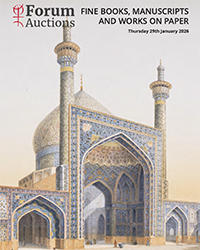
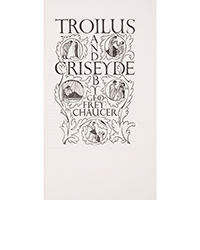
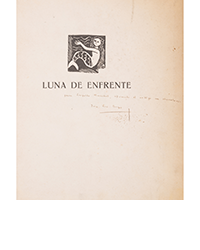
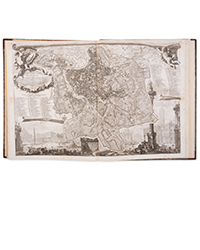
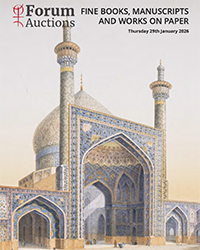
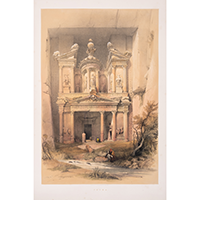
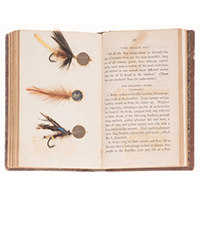
![<b>Forum, Jan. 29:</b> Herschel (Sir John F. W.) Collection of 69 offprints, extracts and separate publications by Herschel, bound for his son, William James Herschel, 3 vol., [1813-50]. £15,000-20,000 <b>Forum, Jan. 29:</b> Herschel (Sir John F. W.) Collection of 69 offprints, extracts and separate publications by Herschel, bound for his son, William James Herschel, 3 vol., [1813-50]. £15,000-20,000](https://ae-files.s3.amazonaws.com/AdvertisementPhotos/a06cc0dd-7619-45e9-b155-5ad75ed7b2e5.png)